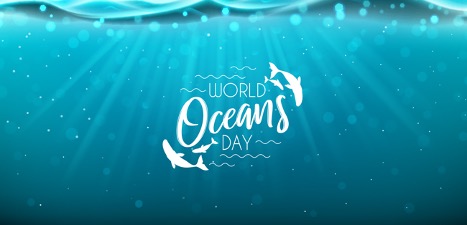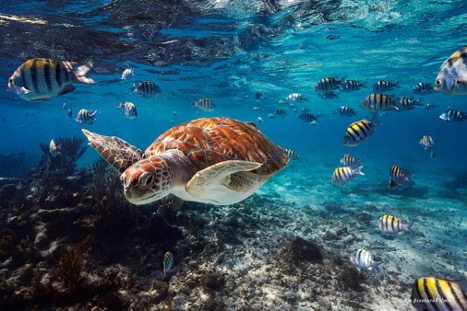VA Insight | Care the ocean as we care human beings
The ocean covers 70% of the earth’s surface. While it is the home to over half of the known species on the earth, ocean provides living space, atmospheric environment, food and livelihood for human beings. Meanwhile, ocean’s health influence the survival of the earth and human beings, but its’ status quo is not optimistic.
As June 8th marks the 13th “World Ocean Day” and the 14th “National Marine Awareness Day”, VA would like to present the observations on marine conservation in China and globally.

At the 18th National Congress of the Communist Party of China, “ecological civilization” was induced in the national “five in one” socialistic modernization overall arrangement. Since then, the principle of ecological prioritization and green development began to underly all ocean related topics. The 14th Five-Year Plan further defined the state’s marine development strategy, which includes “insist overall planning of land and ocean, harmony between human and ocean, win-win cooperation, improve marine ecological conservation in line with economic development and the protection of marine rights and interest, and speed up the building of a powerful maritime country”, which move the importance of ” protection of marine ecology” to a new level.
The practice of marine conservation in China started recently. Currently, marine health is facing multiple threats, such as increasing severe pollution, acidification and warming caused by climate change, irresponsible fishing, less supervised ocean related projects and industries. All these lead to the destruction and loss of marine species diversity and ecosystem. By sharing the trends and ideas of global marine conservation, as well as the domestic practice, this essay calls for more related parties to put more emphasis into marine issues, and apply the relevant concepts and methods into ocean protection, so as to jointly improve the health and well-being of the ocean.

Trends of Global Marine Conservation
In the past decade, international community has paying more attention to marine protection, and its willingness to take action has been increasing. Furthermore, the international community has proposed a series of specific conservation targets:
2010: UN adopted Strategic Plan for Biodiversity 2011-2020, including Aichi Biodiversity Targets. Target 11 clearly states that 10% of costal and marine areas are well conserved and managed.
2015: UN Sustainable Development Goals (SDG) was released, SDG14 is directly related to ocean — Conserve and sustainably use the oceans, seas and marine resources for sustainable development
2020: Secretariat of UN Convention on Biological Diversity released Zero draft post-2020 Global Biodiversity Framework, which proposes an action target that at least 30% of ocean is effectively conserved by 2030, hoping to be adopted in COP15.
In order to achieve these targets, different governments and environmental organizations actively take a range of actions which illustrate four trends:
Trend 1: Global marine conservation is still dominated by government capital, however, charitable giving become more active; the private sector is relatively conservative, but begin to pilot novel market tools
Trend 2: The importance of cross sectoral cooperation has been widely recognized, and the multi-party coordination mechanism has been constantly explored
Trend 3: Comprehensive and innovative intervention tools are constantly emerging, speeding up the progress of marine conservation. Typical intervention tools include certification system, trading mechanism, financing mechanism and technological innovation application.
Trend 4: The effectiveness of marine protected areas (MPA) has been widely recognized, and the overall investment on MPA has increased

Practices of Domestic Marine Conservation
In domestic marine conservation, overall environment illustrates positive trends. Beside the policy of “building a maritime power” and vigorously building “ecological civilization”, the public and the private sector have also released a promising signal that the general public’s awareness on marine protection is gradually awakening, which is manifested by the improved learning of environmental protection knowledge, the increased attention to the right to know marine information, and the larger demand for green and sustainable consumption within previous years. At the same time, the private sector began to take action to support the concept of “sustainable development”, such as integrated the concept into business and built a greener business structure, donated to professional NGOs or implement joint projects with them.
However, NGOs working on marine conservation in China is still in the primary stage, which witness some critical challenges:
Challenge 1: NGOs overall are relatively weak to tackle marine issues
Challenge 2: Cross sectoral cooperation mechanism between NGOs and other sectors has not been effectively formed, which cannot fully meet the characteristics of highly complex and needing comprehensive intervention in marine conservation
Challenge 3: China’s charitable giving into marine conservation mainly come from international donation, and the incremental potential of the total funding pool is still unclear

Meanwhile, we are happy to see some leading organizations endeavor to innovate and make breakthrough, so as to incubate and sprout good practices. First of all, a variety of “action alliances” driven by goals and jointly combat marine issues are forming. Secondly, NGOs’ leading practice and leveraging cross-border forces are increasing. Finally, there is more focus put on sectoral infrastructure construction and the mission with long-term development vision.
In a nutshell, marine conservation cannot be achieved overnight, yet it is closely related to everyone and has a long way to go. As President Xi Jinping stated in April 2019 at the event of 70th anniversary National Navy, “We should care the ocean as we care human being”.
